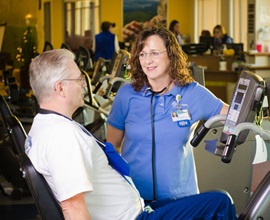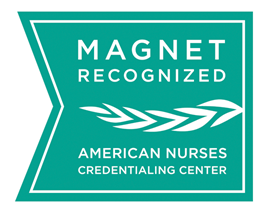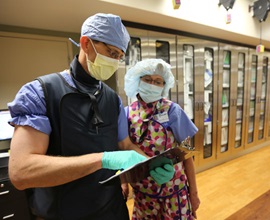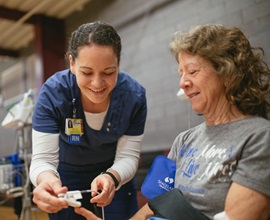
Serving Nurses through Scholarly Activity, Exemplary Practice and Innovation
St. Luke's Nursing and Patient Care Center of Excellence brings clinical nurses, nurse leaders, and other professionals together to strengthen and refine clinical knowledge and practice. The Center serves nurses that seek excellence through professional development opportunities that advance, cultivate and inspire exceptional practice and quality.
The Center offers services that support Transformational Leadership, Structural Empowerment, Exemplary Professional Practice and New Knowledge and Innovations.
The Center’s programs are aimed to assist nurses at any career stage, and are accessible in all of our locations, including urban, rural, critical access, and telehealth nursing environments.
Core Principles

Relationship-Based Care
Relationship-based care is the clinical professional practice model for St. Luke’s. The professional practice model centers on three key relationships: care of self, colleagues, and patient and family. St. Luke’s employees demonstrate the professional practice model by role-modeling the six behaviors that support the caring relationships (Leader, Guide, Healer, Collaborator, Teacher, Sentry). Relationship-based care and the ICARE values (Integrity, Compassion, Accountability, Respect, and Excellence) are foundational to providing an exceptional experience to the communities St. Luke’s serves.
In addition, relationship-based care helps transform the workplace into an environment in which personal responsibility prevails, healthy relationships flourish, gratitude is openly expressed, and exceptional care is the constant and core reasons for being. At St. Luke’s, relationship-based care helps us strengthen leadership, improve patient care, design effective systems, and build winning teams. We provide support and care through touch, kind acts, competent clinical intervention, customer service, active listening, and open communication/dialogue.

Evidence-Based Practice
Evidence-based practice is the intentional use of high-quality evidence to guide nursing practice. Our Nursing and Patient Care Center of Excellence follows the Johns Hopkins model for evidence-based practice projects. These tools help ensure that the right evidence is gathered, that all evidence is rigorously and systematically appraised, and that recommendations and implementation of new practices are based on only the best evidence.
Programs & Initiatives
-
showing 5 of 5








